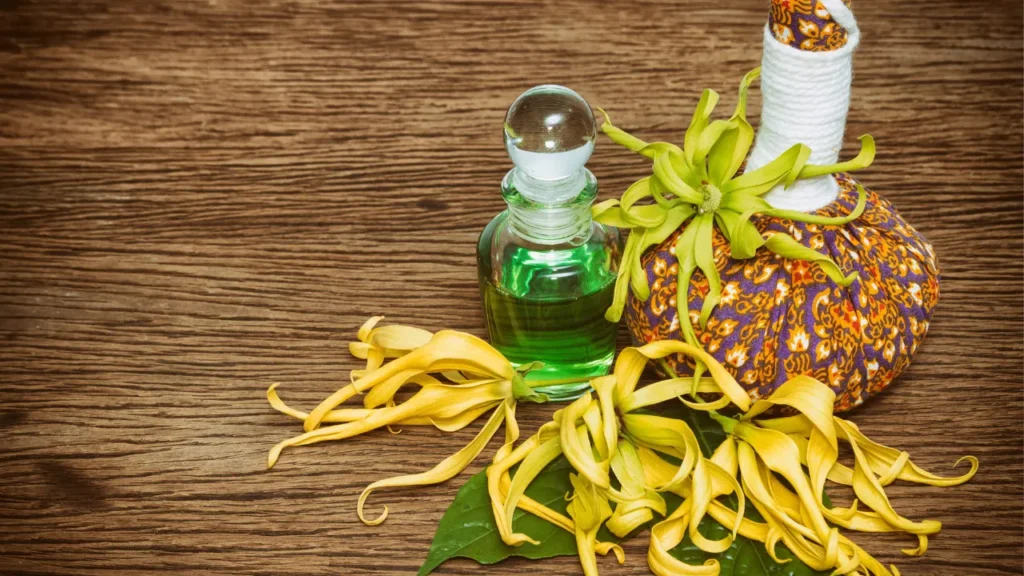Southeast Asian native cananga odorata tree flowers are used to make ylang ylang oil, which has recently attracted a lot of interest for its possible health benefits and uses in aromatherapy, cosmetics, and traditional medicine. This article explores the chemistry of ylang ylang oil, its alleged health advantages, ideal dosage, side effects, possible drug interactions, and recommendations for responsible usage, all of which are backed up by scientific data.
You May Also Like:
Enhance Mental Agility: 3 Big Benefits of Omega-3s for Cognitive Function
Build Bright Brains with Omega-3s: The 7 Powerful Benefits for Brain Development in Kids
Ylang Ylang Oil: Benefits, Dosage, Side Effects, Drug Interactions, And Other Important Information is an original (NootropicsPlanet) article.
Nature of Ylang Ylang Oil
The fragrant blossoms of the cananga odorata tree, a tropical plant indigenous to Southeast Asia, particularly the Philippines, Indonesia, and Malaysia, are the source of ylang ylang oil, an essential oil. The Tagalog word “ilang,” which means “wilderness” or “rare,” is where the name “ylang ylang” originates. It alludes to the tree’s native environment and the distinctive scent of its blossoms.
The cananga odorata tree is a fast-growing, evergreen plant that can grow up to 20 meters tall. Large, drooping, yellow-green flowers are produced, and they have a distinctive, sweet, and floral scent that is stronger at night to draw pollinators. To get the highest usage of the essential oil concentration, the blooms are picked early in the morning, ideally before sunrise. A procedure of steam distillation is then used to separate the volatile aromatic compounds from the essential oil. Steam is passed through the flowers during this process.
The cosmetic industry, aromatherapy, and traditional medicine all use ylang ylang oil in various ways. It has been used in conventional medicine for its sedative, antispasmodic, and antiseptic effects. Ylang ylang Oil is frequently used in aromatherapy due to its relaxing, stress-relieving, and mood-lifting properties. Due to its pleasant scent and potential skin advantages, the oil is a popular ingredient in fragrances, soaps, and skincare products in the cosmetics category.
Health Benefits of Ylang Ylang Oil
1. Tension Reduction and Anxiety Relief: Many studies have shown that ylang ylang oil has the ability to reduce tension and anxiety. Inhaling ylang ylang oil was found to lower blood pressure, heart rate, and subjective stress levels in healthy participants in a study by Hongratanaworakit (2006). Linalool, a monoterpene with calming properties that affects the GABAergic system in the brain, is thought to be the cause of the ylang ylang oil’s anxiolytic effects.
2. Antidepressant Effects: The antidepressant effects of ylang ylang oil have been thoroughly researched. Ylang ylang oil displayed antidepressant-like effects in a mouse animal testing subject of depression in a study by Seol et al. (2010). This could be because it affects the serotonergic and dopaminergic systems.
3. Antimicrobial and Anti-fungal Properties: In numerous in vitro experiments, ylang ylang oil demonstrated significant antimicrobial and anti-fungal properties. The oil showed antibacterial action against a variety of gram-positive and gram-negative bacteria, including staphylococcus aureus and escherichia coli, according to a study by Wiska et al. (2019). Additionally, ylang ylang oil showed anti-fungal activity against species of candida, indicating potential uses in the management of topical fungus infections.
4. Anti-inflammatory and Analgesic Effects: Studies have demonstrated the anti-inflammatory and analgesic peoperties of ylang ylang oil. According to a study by Yang et al. (2014), the oil inhibited inflammatory mediators such prostaglandins and nitric oxide, which led to the reduction of carrageenan- and acetic acid-induced paw edema and writhing in mice.

Chemistry of Ylang Ylang Oil
The unique chemical makeup of ylang ylang oil is responsible for its medicinal effects. Monoterpenes, sesquiterpenes, and phenylpropanoids are the essential oil’s main chemical components. Among these, linalool, geranyl acetate, caryophyllene, and p-cresyl methyl ether are the most common constituents. The oil also contains various esters, like benzyl acetate and methyl benzoate, which give it a pleasant, floral scent.
Depending on variables such as the geographic area, the method of extraction, and the particular flower portion used for extraction, ylang ylang oil’s composition can change. The essential oil is often extracted through steam distillation, which produces various grades labeled “extra,” “I,” “II,” and “III.” Each grade has a distinct chemical composition that establishes its eligibility for different uses and health advantages.
Physiological Properties of Ylang Ylang Oil
The intricate interactions of ylang ylang oil’s bio-active ingredients with many physiological systems in the body are responsible for its beneficial effects on health. Some of the main therapeutic properties of ylang ylang oil are as follows:
1. Calming and Anxiolytic Effects: The central nervous system effects the GABAergic system’s regulation, and is principally responsible for the ylang ylang oil’s calming and anxiolytic effects. The inhibitory neurotransmitter GABA (gamma-aminobutyric acid) is essential for controlling neuronal excitability and preserving equilibrium in the central nervous system. According to research by Linck et al. (2010), linalool, a key component of ylang ylang oil raises GABA levels in the brain, which reduces anxiety and tension. The serotonergic and dopaminergic systems, which are involved in the control of mood, may also be affected by ylang ylang oil, which could further its potential antidepressant benefits (Seol et al., 2010).
2. Anti-inflammatory and Analgesic Properties: Nitric oxide and prostaglandin inhibition are thought to be the cause of ylang ylang oil’s anti-inflammatory and analgesic effects. A selective agonist of the cannabinoid type 2 (CB2) receptor, which is known to play a role in controlling inflammation and pain, is thought to be affected by the sesquiterpene caryophyllene, which is present in ylang ylang oil (Gertsch et al., 2008). The anti-inflammatory benefits of ylang ylang oil can also be enhanced by the inhihibition of pro-inflammatory cytokines such tumor necrosis factor-alpha (TNF-alpha) and interleukin-6 (IL-6) (Yang et al., 2014).
3. Antimicrobial and Anti-fungal Agents: The rupture of the microbial cell membrane and suppression of vital cellular processes are responsible for ylang ylang oil’s antibacterial and anti-fungal properties. According to studies (Carson et al., 2006; Wiska et al., 2019), linalool and other bio-active components of ylang ylang oil change the permeability and integrity of bacterial and fungal cell membranes, causing intracellular contents to seep out, ultimately causing cell death. Additionally, ylang ylang oil can prevent the formation of microbial proteins and nucleic acids, which would prevent pathogenic bacteria from proliferating and multiplying.

Optimal Dosage and Administration
The ideal ylang ylang oil dose depends on your age, health, and the intended application. The oil can be applied in the following ways, generally speaking:
1. Aromatherapy: Diffuse 3-5 drops of ylang ylang oil in an essential oil diffuser for 30 to 60 minutes to relieve stress and anxiety.
2. Topical Application: Apply 2-4 drops of ylang ylang oil to 1 tablespoon of a carrier oil (such as coconut, almond, or jojoba oil) for localized pain alleviation and skin problems. Before applying to wider regions, a patch test is advised to check for potential skin reactions.
3. Massage: 5–10 drops of ylang ylang oil should be mixed with an ounce of carrier oil before being applied to the skin during a massage.
4. Bath: Add 5–10 drops of ylang ylang oil to a warm bath along with a dispersant like epsom salt or a carrier oil for a calming and aromatic bath.
Side Effects of Ylang Ylang Oil
When used appropriately, ylang ylang oil is generally regarded as safe, however some people can still experience negative responses or side effects. The most frequent side effect is skin irritability, which can appear as redness, itching, or rash, particularly in those with sensitive skin or allergies.
It is advised to consume ylang ylang oil sparingly, because overusing it can result in nausea, vomiting, or other gastrointestinal problems. Furthermore, ylang ylang oil overuse by topical or inhalation administration can cause headache, vertigo, or hypersensitivity reactions. Before using ylang ylang oil, pregnant or nursing women should speak with a healthcare provider because the oil’s safety during these times has not been well researched.

Potential Interactions of Ylang Ylang Oil
Certain drugs that affect the GABAergic system, such as benzodiazepines and barbiturates, can interact with ylang ylang oil, potentially intensifying their sedative effects. Additionally, ylang ylang oil can affect the efficiency of antidepressant drugs by interacting with them. Before using ylang ylang oil, speak with a doctor if you are on any medications or have any current medical issues.
Responsible Use of Ylang Ylang Oil
Follow the advice below to get the best and safest experience possible with ylang ylang oil:
- Source: Purchase ylang ylang oil from reliable vendors who disclose details about the oil’s chemical composition, extraction process, and purity.
- Storage: To preserve the oil’s effectiveness and shelf life, store ylang ylang oil in a cool, dark location away from direct sunlight.
- Diluting: To lessen the chance of skin irritation, always dilute ylang ylang oil with a carrier oil before applying it topically.
- Allergies and Sensitivities: Before applying ylang ylang oil topically, conduct a patch test to determine your skin’s sensitivity and any possible allergic responses.
- Medical Advice: Before using ylang ylang oil, seek advice from a doctor, aromatherapist, or herbalist, especially if you have any pre-existing medical issues, are on medication, are pregnant, or are nursing.
Ylang Ylang Oil:
Conclusion
The various health advantages of ylang ylang oil, from stress reduction and mood enhancement to antibacterial and anti-inflammatory properties, are due in part to the physiological properties discussed, among others. The particular targets and pathways involved in the therapeutic properties of ylang ylang oil and its many constituents, however, still require more research. Talk to your doctor before starting ylang ylang supplementation to be sure it is right for you.

References:
- The calming effect of Ylang Ylang Oil on the GABAergic system. Retrieved from: https://www.ncbi.nlm.nih.gov/pmc/articles/PMC2995283/
- The anti-inflammatory activity of Ylang Ylang essential oil and its main components in vitro and in vivo. Retrieved from: https://onlinelibrary.wiley.com/doi/full/10.1002/ptr.5106
- Ylang Ylang essential oil and its major constituents as antimicrobial agents: a review. Retrieved from: https://www.tandfonline.com/doi/full/10.1080/10412905.2019.1591899
- Beta-caryophyllene is a dietary cannabinoid. Retrieved from: https://www.pnas.org/content/105/26/9099.long
Important Note: The information contained in this article is for general informational purposes only, and should not be construed as health or medical advice, nor is it intended to diagnose, prevent, treat, or cure any disease or health condition. Before embarking on any diet, fitness regimen, or program of nutritional supplementation, it is advisable to consult your healthcare professional in order to determine its safety and probable efficacy in terms of your individual state of health.
Regarding Nutritional Supplements Or Other Non-Prescription Health Products: If any nutritional supplements or other non-prescription health products are mentioned in the foregoing article, any claims or statements made about them have not been evaluated by the U.S. Food and Drug Administration, and such nutritional supplements or other health products are not intended to diagnose, treat, cure, or prevent any disease.


